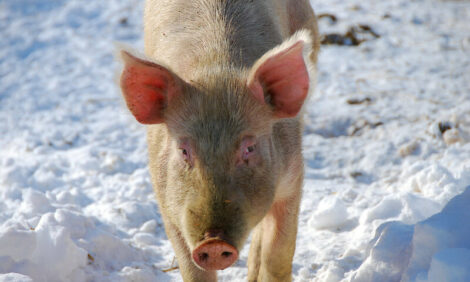USDA should minimize costs, confusion related to COOL, NPPC says
WASHINGTON, D.C. - The U.S. Department of Agriculture (USDA) needs to minimize the costs to both America’s pork producers and consumers and provide clearer direction..
|
Need a Product or service?
|
|
... regarding what will soon be required to comply with proposed mandatory country-of-origin meat labeling guidelines, National Pork Producers Council (NPPC) President Jon Caspers said last week in comments to USDA’s Agricultural Marketing Service (AMS).
Beginning in September 2004, pork producers, facing problematic 2002 Farm Bill provisions, will be required to collect, maintain, track, audit and verify information related to the origin of livestock for the purpose of labeling pork products in retail meat cases. NPPC, which has long opposed country-of-origin labeling (COL) due to additional on-farm costs placed on pork producers, continues to raise concerns about the implementation of this burdensome regulation.
“It is increasingly becoming clear, that the country-of-origin labeling guidelines as currently drafted are wholly inadequate and are going to be very costly for pork producers,“ said Caspers, a pork producer from Swaledale, Iowa. “It is our belief that the costs, including the liability issues of participating in this program far outweigh any benefits that might accrue to participants.“
In its comments, NPPC urged USDA to address the continuing possibility that retailers may impose a costly animal identification and trace-back system in order to protect themselves from the penalties of the law. “USDA should do everything in its power to ensure that any U.S. retailer does not impose this costly solution upon producers and the pork chain in order to meet the stated requirements of the country-of-origin labeling program,“ Caspers said. “At a time of dire economics and low hog prices, it would be questionable as to how many producers would be able to stay in business if this trace-back system was to go into effect.“
NPPC also detailed its concerns on the burden for small pork producers and the impact on pork exports. To highlight the costs for some smaller producers, NPPC stated in its comments that some pork producers have very few records available from which to develop an audit trail and will therefore be required to establish a recordkeeping system now as pigs born on or before April 1, 2004 will be subject to a new mandatory law. That means that sows bred in late November 2003 must be clearly accounted for.
In addition, the practice of U.S. pork producers in obtaining feeder pigs from Canada will now be placed into question. “Clearly the issue of country-of-origin labeling is very complicated for livestock and meat products due to the international mobility of livestock,“ Caspers said. “The costs of segregating Canadian sourced pigs and the products derived from them, for example, will have significant impacts on the pork industry in terms of trade and our ability to compete in a global environment,“ Caspers said. “Retailers have not indicated that they will shy away from putting Canadian labeled pork in the retail meat case and the odds are very good that the label could be viewed positively by U.S. consumers leading to further reductions in the amount of U.S. pork sold in this country.
It is clear that imposing additional and extensive labeling requirements on pork producers will have countless negative effects on the U.S. pork industry,“ Caspers stated. “NPPC urges USDA to modify the guidelines to address the many issues we’ve addressed on this deeply flawed legislation.“
Source: National Pork Producers Council (NPPC) - 15th April 2003

















